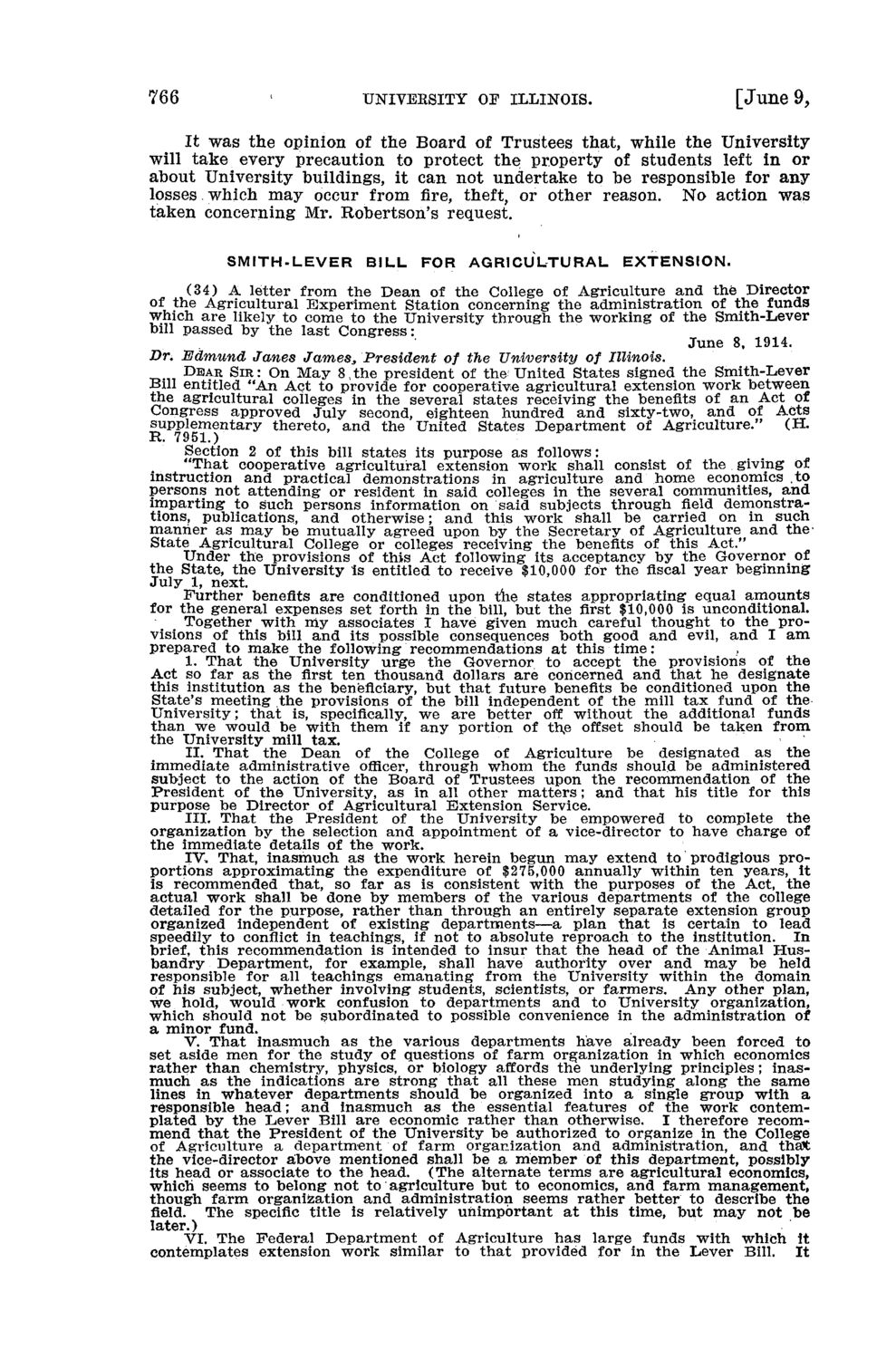| |
| |
Caption: Board of Trustees Minutes - 1914
This is a reduced-resolution page image for fast online browsing.

EXTRACTED TEXT FROM PAGE:
766 UNIVERSITY OF ILLINOIS. [June 9, It was the opinion of the Board of Trustees that, while the University will take every precaution to protect the; property of students left in or about University buildings, it can not undertake to be responsible for any losses. which may occur from fire, theft, or other reason. No action was taken concerning Mr. Robertson's request. SMITH-LEVER BILL FOR AGRICULTURAL EXTENSION. (34) A letter from the Dean of the College of Agriculture and the Director of the Agricultural Experiment Station concerning the administration of the funds which are likely to come to the University through the working of the Smith-Lever bill passed by the last Congress: June 8, 1914. Dr. Edmund Janes Jamesy President of the University of Illinois. DEAR SIR: On May 8,the president of the* United States signed the Smith-Lever Bill entitled "An Act to provide for cooperative agricultural extension work between the agricultural colleges in the several states receiving the benefits of an Act of Congress approved July second, eighteen hundred and sixty-two, and of Acts supplementary thereto, and the United States Department of Agriculture." (H. R. 7951.) Section 2 of this bill states its purpose as follows: "That cooperative agricultural extension work shall consist of the giving of instruction and practical demonstrations in agriculture and home economics .to persons not attending or resident in said colleges in the several communities, and imparting to such persons information on said subjects through field demonstrations, publications, and otherwise; and this work shall be carried on in such manner as may be mutually agreed upon by the Secretary of Agriculture and theState Agricultural College or colleges receiving the benefits of this Act." Under the provisions of this Act following its acceptancy by the Governor of the State, the University is entitled to receive $10,000 for the fiscal year beginning July 1, next. Further benefits are conditioned upon the states appropriating equal amounts for the general expenses set forth in the bill, but the first $10,000 is unconditional. Together with my associates I have given much careful thought to the provisions of this bill and its possible consequences both good and evil, and I am prepared to make the following recommendations at this time: I. That the University urge the Governor to accept the provisions of the Act so far as the first ten thousand dollars are concerned and that he designate this institution as the beneficiary, but that future benefits be conditioned upon the State's meeting the provisions of the bill independent of the mill tax fund of the University; that is, specifically, we are better off without the additional funds than we would be with them if any portion of the offset should be taken from, the University mill tax. II. That the Dean of the College of Agriculture be designated as the immediate administrative officer, through whom the funds should be administered subject to the action of the Board of Trustees upon the recommendation of the President of the University, as in all other matters; and that his title for this purpose be Director of Agricultural Extension Service. III. That the President of the University be empowered to complete the organization by the selection and appointment of a vice-director to have charge of the immediate details of the work. IV. That, inasmuch as the work herein begun may extend to prodigious proportions approximating the expenditure of $275,000 annually within ten years, it is recommended that, so far as is consistent with the purposes of the Act, the actual work shall be done by members of the various departments of the college detailed for the purpose, rather than through an entirely separate extension group organized independent of existing departments—a plan that is certain to lead speedily to conflict in teachings, if not to absolute reproach to the institution. In brief, this recommendation is intended to insur that the head of the Animal Husbandry Department, for example, shall have authority over and may be held responsible for all teachings emanating from the University within the domain of his subject, whether involving students, scientists, or farmers. Any other plan, we hold, would work confusion to departments and to University organization, which should not be subordinated to possible convenience in the administration of a minor fund. V. That inasmuch as the various departments have already been forced to set aside men for the study of questions of farm organization in which economics rather than chemistry, physics, or biology affords the underlying principles; inasmuch as the indications are strong that all these men studying along the same lines in whatever departments should be organized into a single group with a responsible head; and inasmuch as the essential features of the work contemplated by the Lever Bill are economic rather than otherwise. I therefore recommend that the President of the University be authorized to organize in the College of Agriculture a department of farm organization and administration, and tha^t the vice-director above mentioned shall be a member of this department, possibly its head or associate to the head. (The alternate terms are agricultural economics, which seems to belong not to agriculture but to economics, and farm management, though farm organization and administration seems rather better to describe the field. The specific title is relatively unimportant at this time, but may not be later.) VI. The Federal Department of Agriculture has large funds with which it contemplates extension work similar to that provided for in the Lever Bill. It
| |